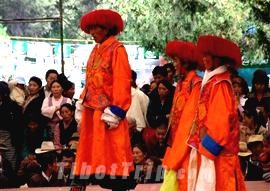 When the seventh Dalai Lama was studying Buddhism in the {{Drepung Monastery|/lhasa/drepung.htm}} , he always came to the western suburb of Lhasa to spend the summer. In the 1740s the Qing officials built the first building in Norbulingka for him. After multiple expansions, it now covers an area of 360, 000 square meters (88.9 acres). In his later years, the seventh Dalai built the first palace there, Kelsang Potrang, and named the area Norbulingka. With the approval of the Qing Government, he came to Norbulingka each summer to conduct official affairs. In the following 200 years, continuous construction took place in the area. Beside a lake, the eighth Dalai Lama built a group of buildings called Tsokyil Potrang, which are thought to be the most beautiful places in Norbulingka today. The thirteenth Dalai Lama built Golden Linka and Chensel Potrang and the fourteenth Dalai Lama built Takten Migyur Potrang. There are large areas of green woods, grasses, and various flowers adorning the buildings, and yellow tiles and golden roofs add radiance and beauty to the red and white walls.
When the seventh Dalai Lama was studying Buddhism in the {{Drepung Monastery|/lhasa/drepung.htm}} , he always came to the western suburb of Lhasa to spend the summer. In the 1740s the Qing officials built the first building in Norbulingka for him. After multiple expansions, it now covers an area of 360, 000 square meters (88.9 acres). In his later years, the seventh Dalai built the first palace there, Kelsang Potrang, and named the area Norbulingka. With the approval of the Qing Government, he came to Norbulingka each summer to conduct official affairs. In the following 200 years, continuous construction took place in the area. Beside a lake, the eighth Dalai Lama built a group of buildings called Tsokyil Potrang, which are thought to be the most beautiful places in Norbulingka today. The thirteenth Dalai Lama built Golden Linka and Chensel Potrang and the fourteenth Dalai Lama built Takten Migyur Potrang. There are large areas of green woods, grasses, and various flowers adorning the buildings, and yellow tiles and golden roofs add radiance and beauty to the red and white walls.
 In the past, Norbulingka was a place for Dalai Lamas and high officials only; civilians were not allowed to go in. But now it has become a public park, where people can visit and spend holidays. Norbulingka is the busiest during the Shoton Festival , when Tibetan operas are given by different troupes and almost all families in Lhasa come to stay in Norbulingka, singing and dancing for almost a week.
In the past, Norbulingka was a place for Dalai Lamas and high officials only; civilians were not allowed to go in. But now it has become a public park, where people can visit and spend holidays. Norbulingka is the busiest during the Shoton Festival , when Tibetan operas are given by different troupes and almost all families in Lhasa come to stay in Norbulingka, singing and dancing for almost a week.
|
Admission Fee |
CNY 60 |
|
Opening Hours |
09:00 - 12:00
15:00 - 16:00 |








